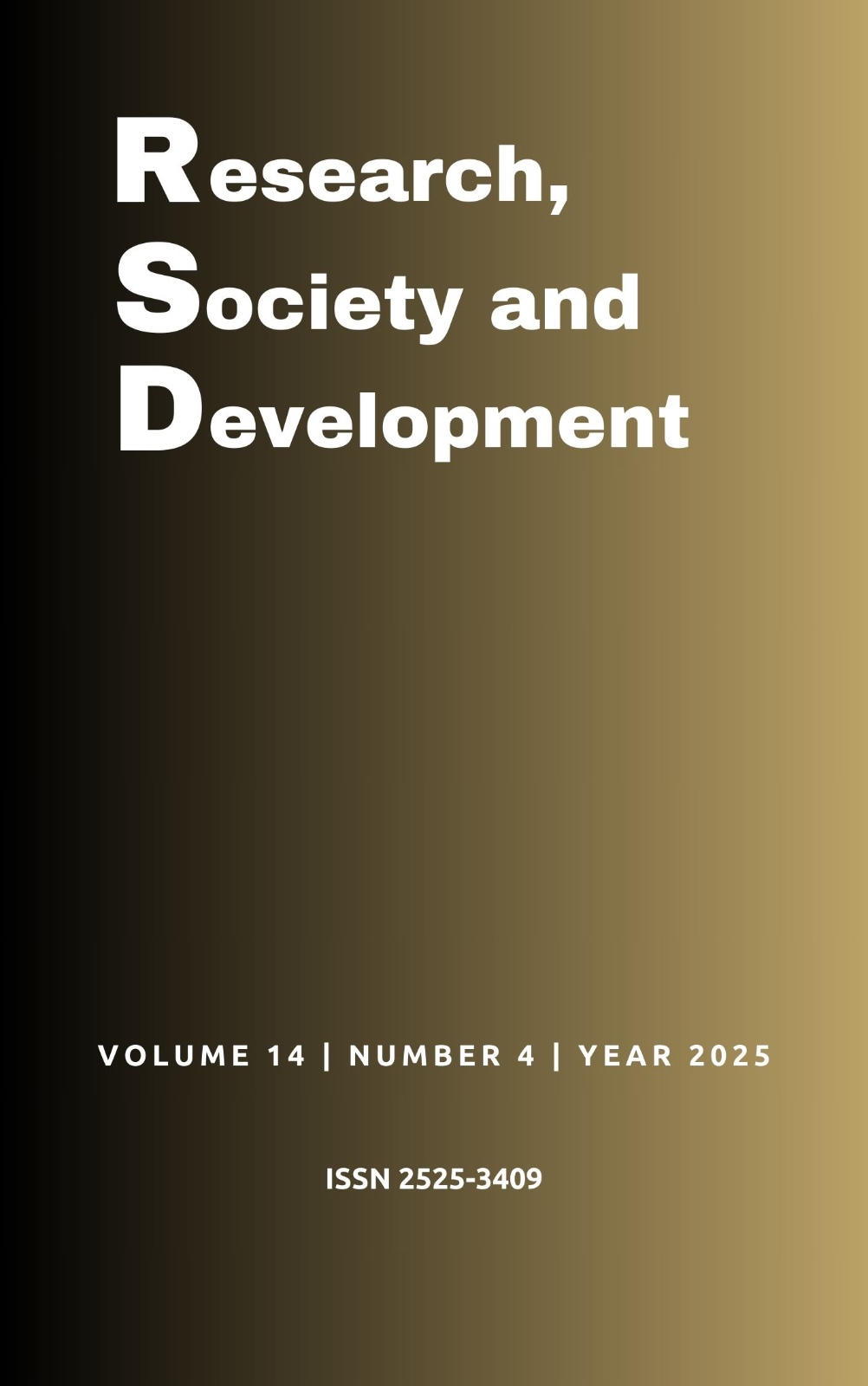Sofrimentos emocionais implicados no trabalho docente manifestados por professores: Uma revisão bibliográfica
DOI:
https://doi.org/10.33448/rsd-v14i4.48626Palavras-chave:
Docentes, Condições de trabalho, Emoções, Ensino, Saúde mental.Resumo
O trabalho do professor da educação infantil ao ensino superior cotidianamente implica em sofrimentos emocionais, que se prolongados pode desencadear patologias psicológicas e/ou físicas. Assim, considerando esta problemática este artigo teve como objetivo mapear na literatura científica os sofrimentos emocionais implicados no trabalho docente manifestados por professores. Trata-se de uma revisão bibliográfica narrativa realizada na Biblioteca Virtual em Saúde (BVS) por meio de dois Descritores em Ciências da Saúde (DeCS). A busca localizou 86 artigos científicos e após a leitura do título e do resumo, foram incluídos oito como corpus de análise. Para análise, foi realizada a leitura minuciosa bem como, a análise crítica dos textos, com a extração dos seguintes dados: autores e ano, título do artigo e os sofrimentos emocionais manifestados pelos professores. Os resultados apontaram que os professores manifestaram com frequência sofrimentos emocionais, independentemente do grau de escolaridade que lecionavam, abarcando a educação infantil, o ensino fundamental e superior. De modo geral, os sofrimentos perpassaram por estresse, frustação, esgotamento, sobrecarga e desgaste emocional. Em conclusão os professores da educação infantil, do ensino fundamental e ainda, do ensino superior manifestaram sofrimentos emocionais implicados ao trabalho docente. E ao considerar que o sofrimento emocional causa riscos para a saúde do sujeito, esses resultados, que destacaram sofrimentos expostos pelos profissionais da educação, poderão ser utilizados como indicadores de vulnerabilidade e adoecimento, devido ao potencial que possuem de evoluir para sintomas físicos e psicológicos patológicos, como ocorre, por exemplo, na Síndrome de Burnout.
Referências
Amaral, G. A., Borges, A. L. & Juiz, A. P. M. (2017). Organização do trabalho, prazer e sofrimento de docentes públicos federais. Cadernos de Psicologia Social do Trabalho. 20 (1), 15–28. doi: 10.11606/issn.1981-0490.v20i1p15-28.
Amarante, P. (2007). Saúde mental e atenção psicossocial. Editora Fiocruz.
Bertão, F. R. B. M., & Hashimoto, F. (2006). Entre o desejo e o sofrimento psíquico no trabalho: um estudo de caso com professora de educação infantil. Miolo Novo Psicol., 12(20), 141–163. https://pepsic.bvsalud.org/scielo.php?script=sci_arttext&pid=S1677-11682006000200004
Casarin, S. T. et al. (2020). Tipos de revisão de literatura: considerações das editoras do Journal of Nursing and Health. Journal of Nursing and Health. 10(5). https://periodicos.ufpel.edu.br/index.php/enfermagem/article/view/19924.
Creswell, J. W. & Creswell, J. D. (2021). Projeto de pesquisa: métodos qualitativo, quantitativo e misto. (5.ed.). Editora Penso.
Freire, P. (2020). Pedagogia da autonomia: saberes necessários à prática educativa. (63ed.). Editora Paz e Terra.
Freitas, L. G. & Facas, E. P. (2013). Vivências de prazer-sofrimento no contexto de trabalho dos professores. Estudos e Pesquisas em Psicologia. 13(1), 7–26. https://pepsic.bvsalud.org/scielo.php?script=sci_arttext&pid=S1808-42812013000100002.
Mattos, P. C. (2015). Tipos de revisão de literatura. Unesp, 1-9. https://www.fca.unesp.br/Home/Biblioteca/tipos-de-evisao-de-literatura.pdf.
Mendes, L., Chaves, C. J. A., Santos, M. C. & Neto, G. A. R. M. (2007). Da arte ao ofício: vivências de sofrimento e significado do trabalho de professor universitário. Revista Mal Estar e Subjetividade. 7(2), 527–56. https://pepsic.bvsalud.org/scielo.php?script=sci_arttext&pid=S1518-61482007000200015.
Neves, M. Y. R. & Silva, E. S. (2006). A dor e a delícia de ser (estar) professora: trabalho docente e saúde mental. Estudos e Pesquisas em Psicologia. 6(1), 63–75. https://pepsic.bvsalud.org/scielo.php?script=sci_arttext&pid=S1808-42812006000100006.
Pena, L. & Remoaldo, P. (2019). Psicodinâmica do Trabalho: um estudo sobre o prazer e o sofrimento no trabalho docente na Universidade Óscar Ribas. Saúde e Sociedade. 28, 147–59. doi: 10.1590/S0104-12902019170487.
Pereira A. S. et al. (2018). Metodologia da pesquisa científica. [free e-book]. Editora UAB/NTE/UFSM.
Prata-Ferreira, P. A. & Vasques-Menezes, I. (2021). Conflitos do professor universitário: o que sabemos sobre isso? Psicologia em Estudo. 26, e46380.
doi: 10.4025/psicolestud.v26i0.46380.
Ribeiro, B. M. S. S., Martins, J. T., Moreira, A. A. O., Galdino, M. J. Q., Lourenço, M. C. F. H. & Dalri, R. C. M. B. (2022). Associação entre a síndrome de burnout e a violência ocupacional em professores. Acta Paulista de Enfermagem. 35, eAPE01902. doi: 10.37689/acta-ape/2022AO01902.
Rother, E. T. (2007). Revisão sistemática x revisão narrativa. Acta Paul. Enferm. 20(2). https://doi.org/10.1590/S0103-21002007000200001.
Snyder, H. (2019). Literature review as a research methodology: An overview and guidelines. Journal of business research, 104, 333-339.
Trevisan, K. R. R., Cruz, R. M., Dalagasperina, P., Ariño, D. O. & Steil, A. V. (2022). Revisão sistemática internacional sobre agravos à saúde mental de professores. Avances en Psicología Latinoamericana. 40(1). doi: 10.12804/revistas.urosario.edu.co/apl/a.7532.
WHO. (2025). CID-11. Classificação Internacional de Doenças 11a Revisão. O padrão global para informações de diagnóstico de saúde. World Health Organization (WHO). https://icd.who.int/en/.
Downloads
Publicado
Edição
Seção
Licença
Copyright (c) 2025 Ronaldo Antonio da Silva

Este trabalho está licenciado sob uma licença Creative Commons Attribution 4.0 International License.
Autores que publicam nesta revista concordam com os seguintes termos:
1) Autores mantém os direitos autorais e concedem à revista o direito de primeira publicação, com o trabalho simultaneamente licenciado sob a Licença Creative Commons Attribution que permite o compartilhamento do trabalho com reconhecimento da autoria e publicação inicial nesta revista.
2) Autores têm autorização para assumir contratos adicionais separadamente, para distribuição não-exclusiva da versão do trabalho publicada nesta revista (ex.: publicar em repositório institucional ou como capítulo de livro), com reconhecimento de autoria e publicação inicial nesta revista.
3) Autores têm permissão e são estimulados a publicar e distribuir seu trabalho online (ex.: em repositórios institucionais ou na sua página pessoal) a qualquer ponto antes ou durante o processo editorial, já que isso pode gerar alterações produtivas, bem como aumentar o impacto e a citação do trabalho publicado.


